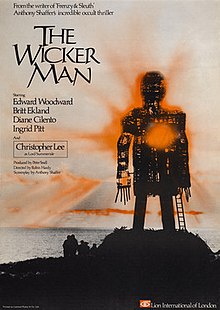A Review of ‘The Wicker Man’ (1973)
[This review may contain spoilers]

November 14, 2022
In 1951, Britain repealed a law from the 1700s that forbade the practice of witchcraft. Throughout the ‘60s, Britain experienced a cultural revolution that instilled the nation with renewed interest in the occult. In the early ‘70s, the rise in counter culture caused moral panic in Britain. One woman, Mary Whitehouse, led a campaign against sex and violence in the media and launched a nationwide petition for public decency.
Enter “The Wicker Man.” This British folk horror film was directed by Robin Hardy and told the story of a devout Christain Police Sergeant who travels to an isolated island in Scotland to find a missing girl. On the island, Sergeant Neil Howie is surprised and appalled to find that the island’s occupants have abandoned Christianity and now practice a form of Celtic paganism.
Due to the social state of Britain, the production company, British Lion Films (which had recently been purchased by EMI), was forced to heavily cut and censor the film, and limited promotion for it in favor of other, more marketable films. Despite this, those who saw the film were blown away by it, and immediately began promoting it via word of mouth. Despite “The Wicker Man” being a British film, a large group of these fans were American, which pushed Robin Hardy and lead actor Christopher Lee to discuss and screen the film in America, thinking perhaps the movie would be better received there—they were right.
In America, the movie was screened for church groups and bible studies, where it was immediately met with praise from southern American Christians. At first glance, it’s an odd couple, considering the movie’s content, but the way the movie discusses religion—both Cristianity and paganism—is surprisingly even-handed, and leads to multiple interpretations depending on the viewer. Nothing is praised, nothing is condemned, and the result is a stunning and detailed hour and a half long movie featuring sprawling Scottish landscapes and hauntingly beautiful music.
The movie is thematically complex, provoking discussions about religion, community, and control–it’s one that makes you think a bit, and it’s a lot of fun to talk about. I personally rate it 4.5/5 paws.





















![Movie poster for '[Rec]" (2007).](https://www.lionnewspaper.com/wp-content/uploads/2023/04/rec-640x900.jpg)

